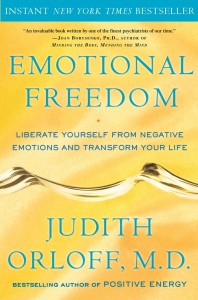How To Release Grudges and Resentments
- Details
- Written by Judith Orloff MD

As a psychiatrist, I feel strongly that letting go of resentments, a point I emphasize in my recent book “Emotional Freedom,” is essential to free yourself from negativity. The main person the resentment hurts is you.
A resentment is a grudge that you harbor after you’ve felt mistreated. It’s easy to hold on to all the incidents that angered you, from a gossiping hairdresser to a two-timing ex-husband. And, if you took a poll, you’d probably get a lot of people on your side about your right to stay resentful. According to such logic, as time passes, you have “the right” to get angrier, becoming a broken record of complaints. But is that the sour person you want to be? Instead, for emotional freedom, try to release resentments and let compassion purify them. One friend, in the midst of that process, likened uncovering resentments to “dragging dead bodies out of a well.” You don’t want moldering negativity rotting your psyche.
Forgiveness is a state of grace, nothing you can force or pretend. I guide patients toward the large-heartedness to forgive both injuries others have caused and those they’ve self-inflicted. Forgiveness penetrates the impenetrable — the obstinacy that stifles love, the tenacious pain that dams our energy reserves. A Stanford research study showed that forgiveness significantly decreases stress, rage and psychosomatic symptoms. I’m not saying that betrayal is ever justified, that you aren’t entitled to be upset if someone wrongs you, or that you shouldn’t try to improve or else leave a destructive situation. Forgiveness, though, ensures that resentments don’t feed on your energy. Finally, remember forgiveness refers to the actor, not the act — not the offense but the woundedness of the offender.
Strategies to Let Resentments Go
- Set Your Intention to Release the Resentment
The purpose of releasing resentments is to increase your energy and to feel better. Select a target: a critical mother, a controlling boyfriend, a cutthroat colleague. Perhaps you’ve tried to discuss the grievance with no results. (Always attempt to work things out if the person is the slightest bit receptive.) Or your target may truly be unapproachable. In either case, away from the person, air your resentments without sugarcoating them. Do this in a journal, or with a therapist or friend. For example, say, “I despise the double-crossing conniver because…” Frankly, expressing your feelings is necessary to forgive. - Cultivate Forgiveness
In a quiet moment, really reach to find compassion for the person’s shortcomings, not the deed itself. This may be very hard work. What insecurities or fears motivated him or her? Why is the person’s heart so closed? What caused his or her moral blindness? Try to discern the context of the person’s actions. At this point, you may be inwardly able to ask yourself to start to forgive. Perhaps you’re not there yet — that’s okay. The request itself sets off a stream of compassion, a cleansing of your system. Repeat the exercise once a day for at least a week. See if your energy improves. I’ll bet you’ll feel a burden lift. - Take a Reality Check
As part of forgiveness, take this reality check: People bring a lifetime of wounds to your relationship, which may make their behavior more about them than you. You might justifiably say, as one of my patients did, “I’m hurt and furious my spouse left me and refused to even talk about it. Isn’t it reasonable to want that?” Naturally it is. But your need doesn’t take into consideration your spouse’s terror of intimacy, or that he or she would do anything to escape it in your relationship or any other. Unfortunately, your spouse’s fears and inadequacies won out over your needs. To find forgiveness while endeavoring to heal anger, you must evaluate whom you’re dealing with, the good and the bad. Often, people are just doing the best they can, which may not amount to a hill of beans where you’re concerned, but it does represent the sad truth of the situation. Accepting that truth of someone’s limitations will help you to forgive.
Compassion opens a hidden door to a secret world that exists beyond anger. Notwithstanding, the feelings of anger or forgiveness aren’t mutually exclusive. You can simultaneously experience varying degrees of both. Perhaps, at first, you’re a little forgiving and very angry. But when you progress, the scales increasingly tip toward forgiveness as your attachment to anger recedes.
“If I stayed angry at other people, I would miss finding friends among those I was angry with.”
–Rosa Parks, from an interview in “Positive Energy“
(Excerpt from “Thriving as an Empath: 365 Days of Self-Care for Sensitive People” by Judith Orloff, MD)

Judith Orloff MD is author of The Empath's Survival Guide: Life Strategies for Sensitive People, upon which her articles are based. Dr. Orloff is a psychiatrist, an empath, and is on the UCLA Psychiatric Clinical Faculty. She synthesizes the pearls of traditional medicine with cutting edge knowledge of intuition, energy, and spirituality. Dr. Orloff also specializes in treating empaths and highly sensitive people in her private practice. Dr. Orloff’s work has been featured on The Today Show, CNN, the Oprah Magazine and USA Today. Source Here
Liked this article? Dive deeper into personal growth and wellness! Check out CrystalWind.ca for spiritual wisdom or explore AromaWorx.ca for natural well-being tips. Spread the positivity—share this with friends on their happiness journey!
Let’s Chat! Drop Your Thoughts Below! ![]()
Latest Articles

Imagine a world of inspiration and healing, free for all—made possible by YOU!
Donate Now—Ignite the Magic at CrystalWind.ca!

Epilepsy - Finding A Cure
Your donation can make a difference!
Help us find a cure – donate now!
Unlock Your Light: Join Lightworkers Worldwide on CrystalWind.ca!
Follow Us!
Featured This Month
Lugh - Celtic God Of The Sun
The god Lugh was worshiped in Ireland as a deity of the sun. This connection... Read more
Lughnasadh Meditation
The Seventh Sabbat of the Wheel is Lughnasadh. Lughnasadh is celebrated on A... Read more
The Season of Lammas
The season of Lammas (also called Lughnasadh) begins on August 1st and conti... Read more
Lammas by The Hedgewitch
Although in the heat of a Mid-western summer it might be difficult to discer... Read more
Lughnasadh (Lammas) - The Celtic Harvest Fes…
The Celtic harvest festival on August 1st takes its name from the Irish god ... Read more












































